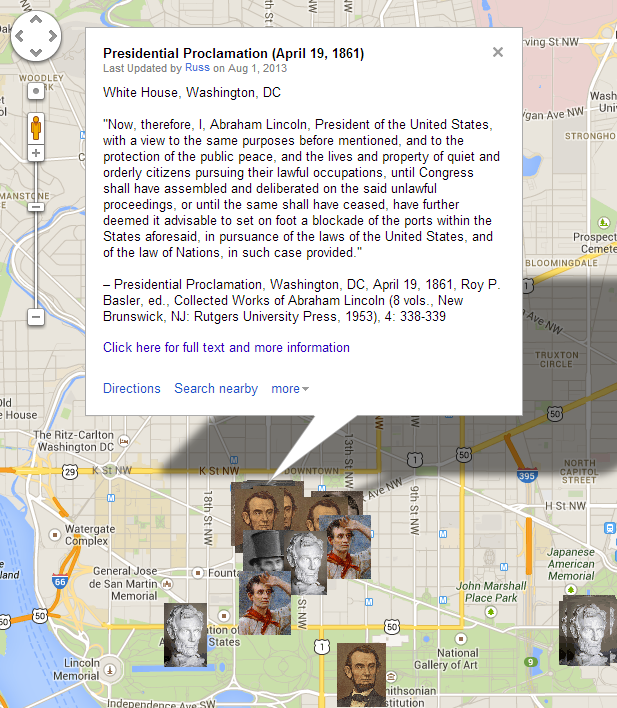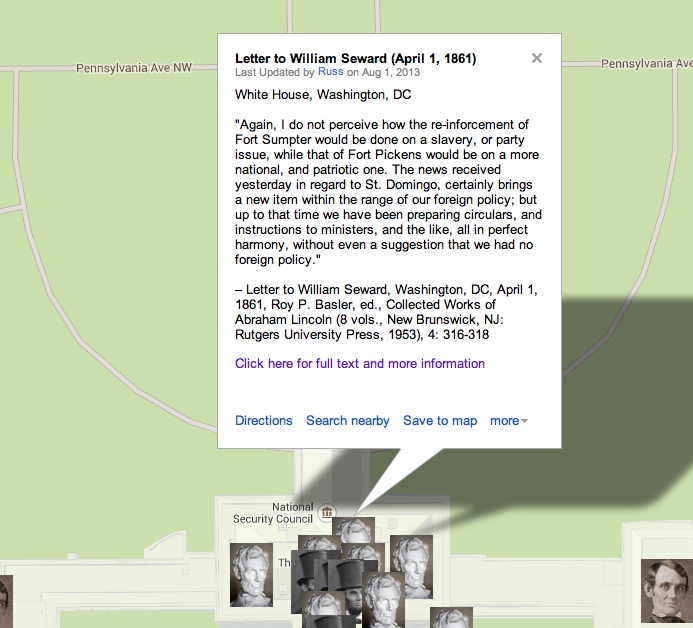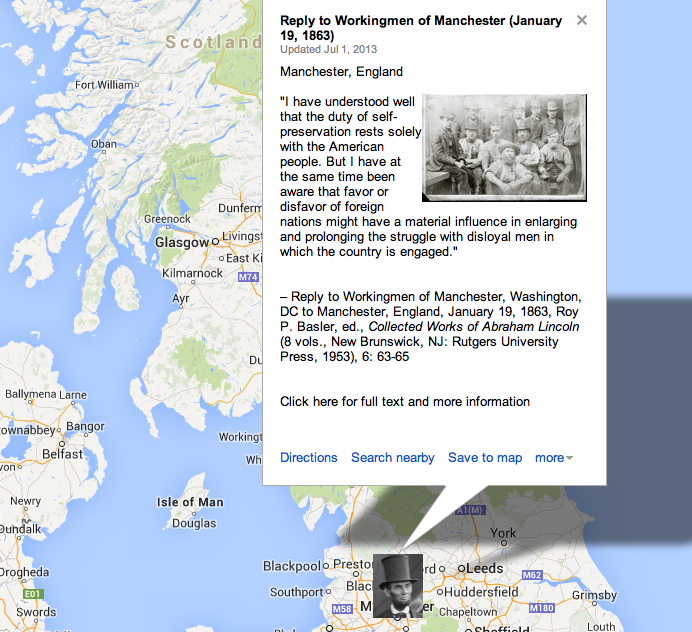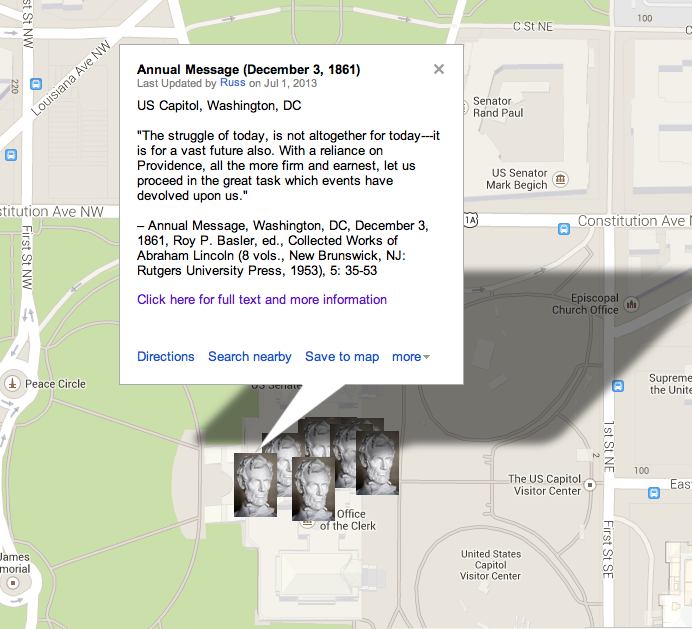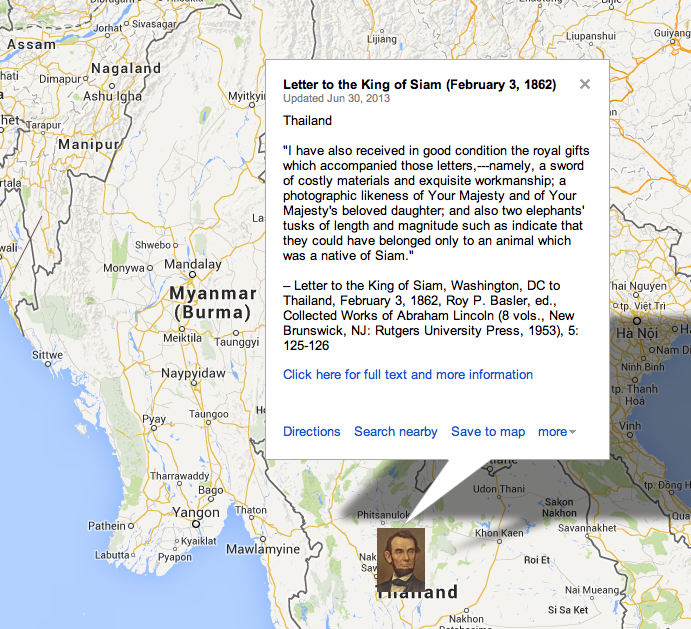Contributing Editors for this page include Gary Emerson
Ranking
#60 on the list of 150 Most Teachable Lincoln Documents
Annotated Transcript
“Fellow-citizens, we cannot escape history. We of this Congress and this administration, will be remembered in spite of ourselves.”
On This Date
HD Daily Report, December 1, 1862
The Lincoln Log, December 1, 1862
Close Readings
Gary Emerson, “Understanding Lincoln” blog post (via Quora), September 2, 2013
Custom Map
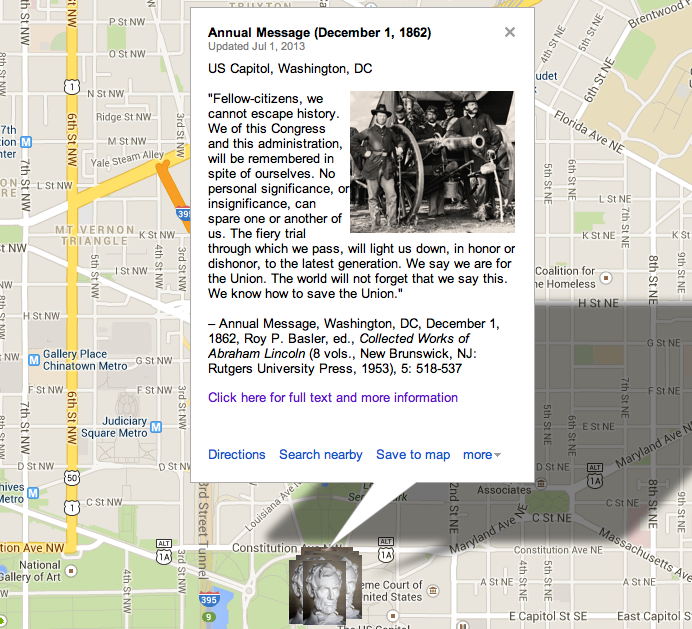
View in Larger Map
How Historians Interpret
“On December 1, 1862—the same day Lincoln sacked all the others who voted to surrender Minnesota’s Third Regiment in Tennessee—President Lincoln gave his annual message to Congress. ‘While it has not pleased the Almighty to bless us with a return of peace,’ he said, ‘we can but press on, guided by the best light He gives us, trusting that in His own good time, and wise way, all will yet be well.’ Saying ‘[t]he Indian tribes upon our frontiers have, during the past year, manifested a spirit of insubordination,’ Lincoln specifically referred to Minnesota’s Sioux Indians. These Indians, he said, had ‘indiscriminately’ killed ‘not less than eight hundred persons’ with ‘extreme ferocity.’ ‘How this outbreak was induced is not definitely known, and suspicious, which may be unjust, need not be stated,’ Lincoln concluded. . . Yet, Lincoln acknowledged the failure of the U.S. government’s Indian policies. . . Though Lincoln wanted reform, his view of Indians differed little from those held by other midwesterners. . . Lincoln viewed Indians as uncivilized wards of the government, and while telling the Indian delegation why farming accounted for the whites’ prosperity, he added another reason, without irony. ‘Although we are now engaged in a great war between one another,’ Lincoln said, ‘we are not, as a race, so much disposed to fight and kill one another as our red brethren.’ Lincoln, who still remained undecided on December 1 about what to do [about ordering the executions of over 300 Sioux Indians who surrendered after the U.S. Dakota War of 1862], angered many Minnesotans by failing to reveal his intentions in his annual message.”
– John D. Bessler, Legacy of Violence: Lynch Mobs and Executions in Minnesota (Minneapolis: University of Minnesota Press, 2003), 51-52
NOTE TO READERS
This page is under construction and will be developed further by students in the new “Understanding Lincoln” online course sponsored by the House Divided Project at Dickinson College and the Gilder Lehrman Institute of American History. To find out more about the course and to see some of our videotaped class sessions, including virtual field trips to Ford’s Theatre and Gettysburg, please visit our Livestream page at http://new.livestream.com/gilderlehrman/lincoln
Searchable Text
…The civil war, which has so radically changed for the moment, the occupations and habits of the American people, has necessarily disturbed the social condition, and affected very deeply the prosperity of the nations with which we have carried on a commerce that has been steadily increasing throughout a period of half a century. It has, at the same time, excited political ambitions and apprehensions which have produced a profound agitation throughout the civilized world. In this unusual agitation we have forborne from taking part in any controversy between foreign states, and between parties or factions in such states. We have attempted no propagandism, and acknowledged no revolution. But we have left to every nation the exclusive conduct and management of its own affairs. Our struggle has been, of course, contemplated by foreign nations with reference less to its own merits, than to its supposed, and often exaggerated effects and consequences resulting to those nations themselves. Nevertheless, complaint on the part of this government, even if it were just, would certainly be unwise.
The treaty with Great Britain for the suppression of the slave trade has been put into operation with a good prospect of complete success. It is an occasion of special pleasure to acknowledge that the execution of it, on the part of Her Majesty’s government, has been marked with a jealous respect for the authority of the United States, and the rights of their moral and loyal citizens….
…Applications have been made to me by many free Americans of African descent to favor their emigration, with a view to such colonization as was contemplated in recent acts of Congress. Other parties, at home and abroad—some from interested motives, others upon patriotic considerations, and still others influenced by philanthropic sentiments—have suggested similar measures; while, on the other hand, several of the Spanish-American republics have protested against the sending of such colonies to their respective territories. Under these circumstances, I have declined to move any such colony to any state, without first obtaining the consent of its government, with an agreement on its part to receive and protect such emigrants in all the rights of freemen; and I have, at the same time, offered to the several states situated within the tropics, or having colonies there, to negotiate with them, subject to the advice and consent of the Senate, to favor the voluntary emigration of persons of that class to their respective territories, upon conditions which shall be equal, just, and humane. Liberia and Hayti are, as yet, the only countries to which colonists of African descent from here, could go with certainty of being received and adopted as citizens; and I regret to say such persons, contemplating colonization, do not seem so willing to migrate to those countries, as to some others, nor so willing as I think their interest demands. I believe, however, opinion among them, in this respect, is improving; and that, ere long, there will be an augmented, and considerable migration to both these countries, from the United States….
…Our national strife springs not from our permanent part; not from the land we inhabit; not from our national homestead. There is no possible severing of this, but would multiply, and not mitigate, evils among us. In all its adaptations and aptitudes, it demands union, and abhors separation. In fact, it would, ere long, force re-union, however much of blood and treasure the separation might have cost.
Our strife pertains to ourselves—to the passing generations of men; and it can, without convulsion, be hushed forever with the passing of one generation.
In this view, I recommend the adoption of the following resolution and articles amendatory to the Constitution of the United States:“Resolved by the Senate and House of Representatives of the United States of America in Congress assembled, (two thirds of both houses concurring,) That the following articles be proposed to the legislatures (or conventions) of the several States as amendments to the Constitution of the United States, all or any of which articles when ratified by three-fourths of the said legislatures (or conventions) to be valid as part or parts of the said Constitution, viz:
“Article —.
“Every State, wherein slavery now exists, which shall abolish the same therein, at any time, or times, before the first day of January, in the year of our Lord one thousand and nine hundred, shall receive compensation from the United States as follows, to wit:
“The President of the United States shall deliver to every such State, bonds of the United States, bearing interest at the rate of — per cent, per annum, to an amount equal to the aggregate sum of for each slave shown to have been therein, by the eig[h]th census of the United States, said bonds to be delivered to such State by instalments, or in one parcel, at the completion of the abolishment, accordingly as the same shall have been gradual, or at one time, within such State; and interest shall begin to run upon any such bond, only from the proper time of its delivery as aforesaid. Any State having received bonds as aforesaid, and afterwards reintroducing or tolerating slavery therein, shall refund to the United States the bonds so received, or the value thereof, and all interest paid thereon.
“Article —.
“All slaves who shall have enjoyed actual freedom by the chances of the war, at any time before the end of the rebellion, shall be forever free; but all owners of such, who shall not have been disloyal, shall be compensated for them, at the same rates as is provided for States adopting abolishment of slavery, but in such way, that no slave shall be twice accounted for.
“Article —.
“Congress may appropriate money, and otherwise provide, for colonizing free colored persons, with their own consent, at any place or places without the United States.”
I beg indulgence to discuss these proposed articles at some length. Without slavery the rebellion could never have existed; without slavery it could not continue.
Among the friends of the Union there is great diversity, of sentiment, and of policy, in regard to slavery, and the African race amongst us. Some would perpetuate slavery; some would abolish it suddenly, and without compensation; some would abolish it gradually, and with compensation; some would remove the freed people from us, and some would retain them with us; and there are yet other minor diversities. Because of these diversities, we waste much strength in struggles among ourselves. By mutual concession we should harmonize, and act together. This would be compromise; but it would be compromise among the friends, and not with the enemies of the Union. These articles are intended to embody a plan of such mutual concessions. If the plan shall be adopted, it is assumed that emancipation will follow, at least, in several of the States.
As to the first article, the main points are: first, the emancipation; secondly, the length of time for consummating it—thirty-seven years; and thirdly, the compensation.
The emancipation will be unsatisfactory to the advocates of perpetual slavery; but the length of time should greatly mitigate their dissatisfaction. The time spares both races from the evils of sudden derangement—in fact, from the necessity of any derangement—while most of those whose habitual course of thought will be disturbed by the measure will have passed away before its consummation. They will never see it. Another class will hail the prospect of emancipation, but will deprecate the length of time. They will feel that it gives too little to the now living slaves. But it really gives them much. It saves them from the vagrant destitution which must largely attend immediate emancipation in localities where their numbers are very great; and it gives the inspiring assurance that their posterity shall be free forever. The plan leaves to each State, choosing to act under it, to abolish slavery now, or at the end of the century, or at any intermediate time, or by degrees, extending over the whole or any part of the period; and it obliges no two states to proceed alike. It also provides for compensation, and generally the mode of making it. This, it would seem, must further mitigate the dissatisfaction of those who favor perpetual slavery, and especially of those who are to receive the compensation. Doubtless some of those who are to pay, and not to receive will object. Yet the measure is both just and economical. In a certain sense the liberation of slaves is the destruction of property—property acquired by descent, or by purchased, the same as any other property. It is no less true for having been often said, that the people of the south are not more responsible for the original introduction of this property, than are the people of the north; and when it is remembered how unhesitatingly we all use cotton and sugar, and share the profits of dealing in them, it may not be quite safe to say, that the south has been more responsible than the north for its continuance. If then, for a common object, this property is to be sacrificed is it not just that it be done at a common charge?
And if, with less money, or money more easily paid, we can preserve the benefits of the Union by this means, than we can by the war alone, is it not also economical to do it?
… Is it doubted, then, that the plan I propose, if adopted, would shorten the war, and thus lessen its expenditure of money and of blood? Is it doubted that it would restore the national authority and national prosperity, and perpetuate both indefinitely? Is it doubted that we here—Congress and Executive—can secure its adoption? Will not the good people respond to a united, and earnest appeal from us? Can we, can they, by any other means, so certainly, or so speedily, assure these vital objects? We can succeed only by concert. It is not “can any of us imagine better?” but “can we all do better?” Object whatsoever is possible, still the question recurs “can we do better?” The dogmas of the quiet past, are inadequate to the stormy present. The occasion is piled high with difficulty, and we must rise with the occasion. As our case is new, so we must think anew, and act anew. We must disenthrall our selves, and then we shall save our country.
Fellow-citizens, we cannot escape history. We of this Congress and this administration, will be remembered in spite of ourselves. No personal significance, or insignificance, can spare one or another of us. The fiery trial through which we pass, will light us down, in honor or dishonor, to the latest generation. We say we are for the Union. The world will not forget that we say this. We know how to save the Union. The world knows we do know how to save it. We—even we here—hold the power, and bear the responsibility. Ingiving freedom to the slave, we assure freedom to the free—honorable alike in what we give, and what we preserve. We shall nobly save, or meanly lose, the last best, hope of earth. Other means may succeed; this could not fail. The way is plain, peaceful, generous, just—a way which, if followed, the world will forever applaud, and God must forever bless.

